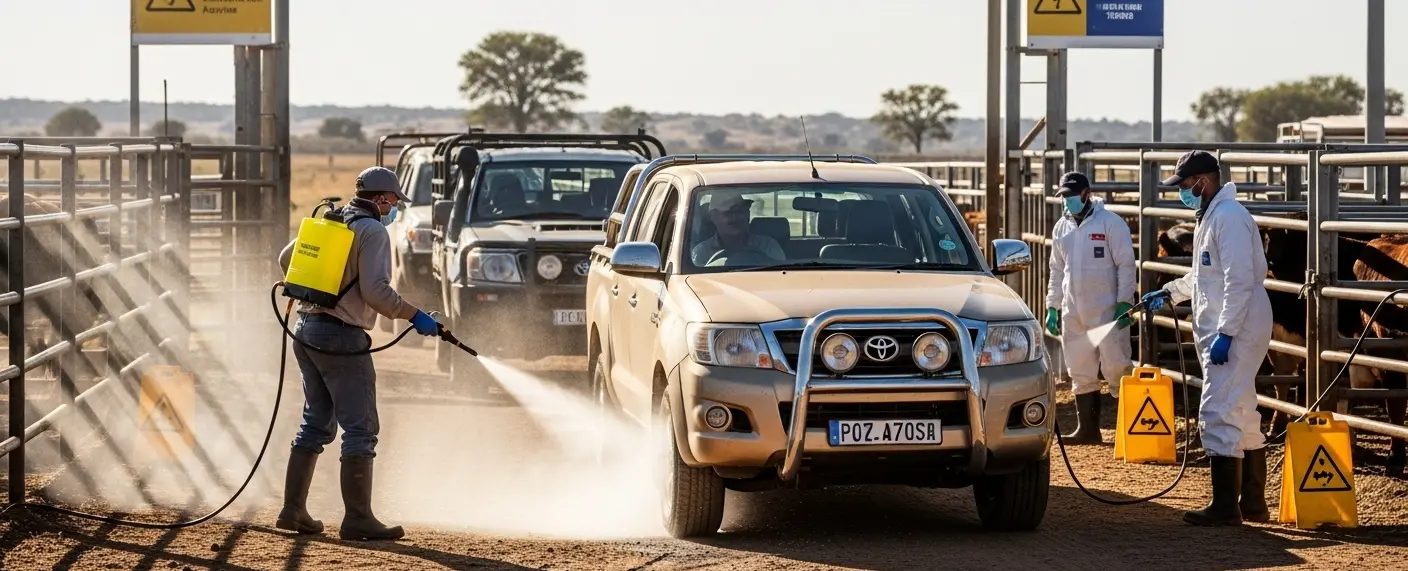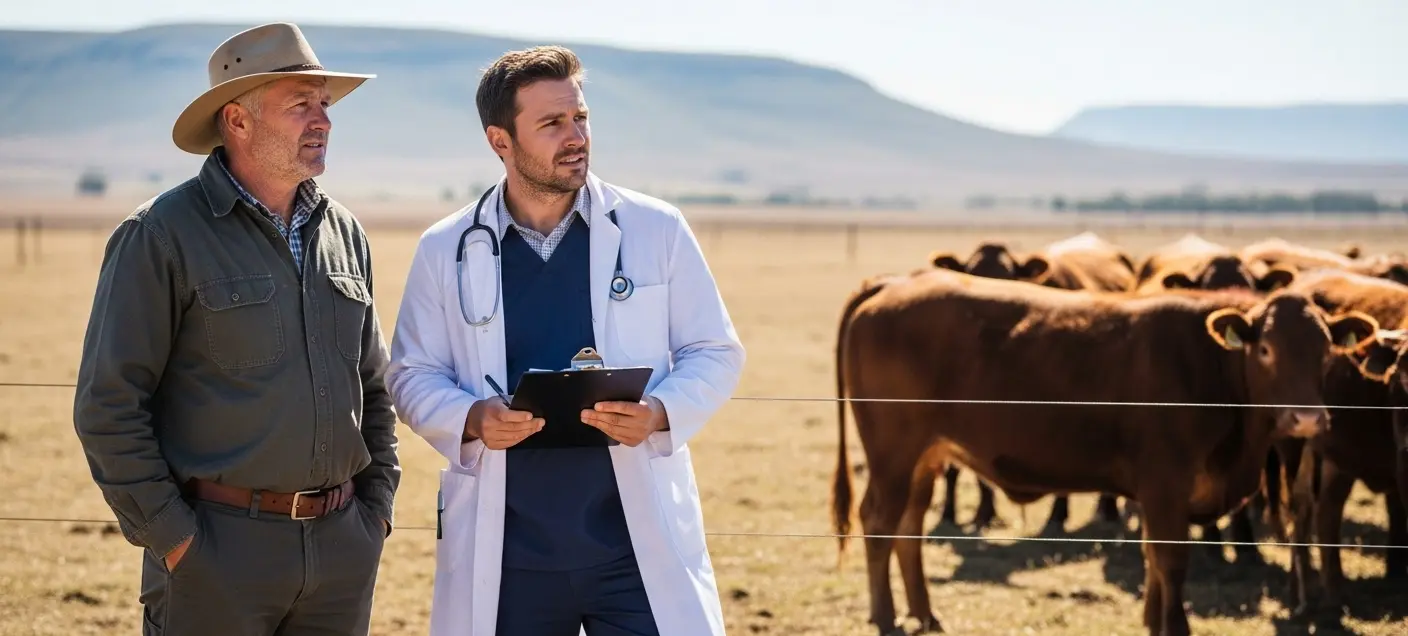Wanneer bek-en-klouseer weer die nuus haal, is die eerste vraag gewoonlik: Is vleis nog veilig om te eet? Die antwoord is eenvoudig: Ja. Hierdie virus raak net diere en kan nie na mense oorgedra word nie. Boonop vereis die Vleisveiligheidswet dat vleis ’n pH-vlak onder 6 moet hê voordat dit bemark mag word. Op dié vlak oorleef die virus nie. Jou biefstuk of boerewors is dus nie in gevaar nie.
Maar wat van ons as telers? Hoe beïnvloed bek-en-klouseer (BKS) ons bedryf , en watter slim stappe hou ons kuddes veilig?
Wat beteken hierdie uitbrake vir jou kudde?
Bek-en-klouseer het weer in Mei 2025 kop uitgesteek en nuwe uitbrake is selfs in die Vrystaat aangemeld. KwaZulu-Natal dra steeds die swaarste las, maar die situasie verander vinnig. Dit plaas druk op boere om ekstra waaksaam te wees.
Die realiteit? Ons kan nie alles beheer nie, maar ons kan baie doen om risiko’s te verminder. Hier is vyf beginsels wat vir Bonzo Bonsmaras ’n prioriteit is:
Vyf goue reëls om jou kudde te beskerm
1. Ontsmet, en doen dit reg
Alle voertuie, persone en toerusting wat die plaas binnegaan, moet ontsmet word. Vir voertuie maak ons seker dat daar geen oraganiese materiaal teenwoordig is nie, ons ontsmet voertuie en toerusting met ‘n oplossing van F10CL (wat geregistreer is vir bek-en-klouseer).

Persone wat die plaas binnekom gebruik ‘n voetbad met ‘n oplossing van VirkonS of Virogon teen die regte konsentrasies asook kontaktye. Ons span maak seker dat werkers die regte konsentrasies en kontaktyd gebruik en dat ontsmettingsbakke by alle ingangspunte beskikbaar is asook by ons krale.
Konsekwentheid is die sleutel. Bogenoemde voorsorgmaatreëls moet streng toegepas word, maar dit bly steeds die beste praktyk om toegang te beperk.
2. Kwarantyn is jou eerste versperring
In die geval dat ‘n nuwe dier by die kudde aansluit, hou ons hierdie dier vir 28 dae apart in kwarantyn. Hierdie tydperk gee genoeg ruimte om enige simptome uit te wys voordat kontak met ander diere op die plaas plaasvind. By Bonzo glo ons in proaktiewe monitering. Eerstens die neem van basiese data soos temperatuur. Tweedens moniteiring van eetlus gedurende kwarantyn tydperk. Derdens hou goeie rekord van alle data.
3. Wees slim oor veilings
By Bonzo beskou ons veilings as ’n risiko en ’n geleentheid. Ons adviseer kliënte om streng by veilings se bio-sekuriteit maatreëls te hou. Bonzo hou self ook rekord van ons eie bewegings tussen veilings, plase en mede telers. Dié vlak van naspeurbaarheid skep gemoedsrus en versterk ons verantwoordbaarheid as stoet. Die volgende maatreëls is nie onderhandelbaar nie:
- Aparte hantering van diere uit verskillende areas.
- Ontsmetting van alle voertuie, persone en toerusing asook hanteringsareas.
- Volledige gesondheidsverklarings en oorsprongsertifikate vir elke dier.
4. Leer hoe om simptome vroeg te herken
Klassieke tekens sluit in blase in die bek, speekselvloei en mankheid. Reageer vinnig – rapporteer enige vermoede onmiddellik aan jou veearts. Ons raad: maak dit prakties vir jou span. Ons gebruik eenvoudige handleidings met foto’s in ons hanteringsareas sodat almal weet waarna om te kyk. Hoe vinniger jy ’n siek dier apart hou, hoe kleiner is jou risiko.
5. Jou veearts is jou strategiese vennoot
Hul rol gaan verder as noodgevalle. Veeartse help om kwarantynprotokolle op te stel, biosekuriteit te verbeter en aksieplanne vir jou plaas aan te pas.’n Kort gesprek met jou veearts oor beweging of aankoop van diere kan later duisende rande se verliese voorkom. Ons hou ook kontaklyste van alle veeartse en noodnommers sigbaar in ons kantoor en stuur dit gereeld aan personeel deur.

Wat gebeur agter die skerms in die bedryf?
Die bedryf neem groot stappe om beheer te verbeter. Die Red Meat Industry Services (RMIS) stel ’n digitale stelsel bekend wat uitbrake vinnig kommunikeer, en ’n ondersteuningsfonds word ondersoek om finansiële verliese te verlig.
Tydens die indaba op 21 en 22 Julie het kenners oor nuwe strategieë besin, insluitend ’n streeksgebaseerde raamwerk om uitvoere minder kwesbaar te maak. Daar is ook klem gelê op belegging in plaaslike navorsing en infrastruktuur; iets wat elke teler op die lang termyn gaan bevoordeel.
Ten slotte, bek-en-klouseer is ’n uitdaging wat ons almal raak, maar paniek help niemand nie. Slim, konsekwente bestuur maak die verskil. By Bonzo Bonsmaras hou ons nie net ons eie kudde beskerm nie – ons deel kennis sodat die hele bedryf kan floreer.
When foot-and-mouth disease hits the news again, the first question is usually: Is meat still safe to eat? The answer is simple: Yes. This virus only affects animals and cannot be transmitted to humans. In addition, the Meat Safety Act requires that meat have a pH level below 6 before it can be marketed. At this level, the virus does not survive. So your steak or boerewors is not at risk.
But what about us as breeders? How does foot-and-mouth disease (FMD) affect our industry, and what smart steps can we take to keep our herds safe?
What do these outbreaks mean for your herd?
Foot-and-mouth disease resurfaced in May 2025, and new outbreaks have even been reported in the Free State. KwaZulu-Natal continues to bear the brunt, but the situation is changing rapidly. This puts pressure on farmers to be extra vigilant.
The reality? We can't control everything, but we can do a lot to reduce risks. Here are five principles that are a priority for Bonzo Bonsmaras:
Five golden rules to protect your herd
1. Disinfect, and do it right
All vehicles, people and equipment entering the farm must be disinfected. For vehicles, we ensure that no organic material is present and disinfect vehicles and equipment with a solution of F10CL (which is registered for foot-and-mouth disease).

Persons entering the farm use a footbath with a solution of VirkonS or Virogon at the correct concentrations and contact times. Our team ensures that workers use the correct concentrations and contact times and that disinfection bowls are available at all entry points, as well as at our pens.
Consistency is key. The above precautions must be strictly applied, but it remains best practice to limit access.
2. Quarantine is your first barrier
If a new animal joins the herd, we keep it separately in quarantine for 28 days. This period gives enough time for any symptoms to show before contact with other animals on the farm occurs. At Bonzo, we believe in proactive monitoring. Firstly, taking basic data such as temperature. Secondly, it is essential to monitor appetite during the quarantine period. Thirdly, it is essential to keep good records of all data.
3. Be smart about auctions
At Bonzo, we view auctions as a risk and an opportunity. We advise clients to strictly adhere to the auctions' biosecurity measures. Bonzo also keeps records of our own movements between auctions, farms and fellow breeders. This level of traceability creates peace of mind and strengthens our accountability as a stud. The following measures are non-negotiable:
Separate handling of animals from different areas.
Disinfection of all vehicles, people and equipment as well as handling areas.
Complete health declarations and certificates of origin for each animal.
4. Learn how to recognise symptoms early
Classic signs include blisters in the mouth, salivation and lameness. React quickly – report any suspicions to your vet immediately. Our advice: make it practical for your team. We use simple manuals with photos in our handling areas so everyone knows what to look for. The faster you keep a sick animal separate, the lower your risk.
5. Your vet is your strategic partner
Their role goes beyond emergencies. Veterinarians help to set up quarantine protocols, improve biosecurity and adjust action plans for your farm. A quick chat with your vet about the movement or purchase of animals can prevent thousands of rands in losses later. We also keep contact lists of all vets and emergency numbers visible in our office and regularly send them to staff.

What's happening behind the scenes in the industry?
The industry is taking significant steps to improve control. The Red Meat Industry Services (RMIS) is launching a digital system that will quickly communicate outbreaks, and a support fund is being explored to alleviate financial losses.
During the indaba on 21 and 22 July, experts reflected on new strategies, including a region-based framework to make exports less vulnerable. There was also an emphasis on investing in local research and infrastructure, something that will benefit every breeder in the long term.
In conclusion, foot-and-mouth disease is a challenge that affects us all, but panicking helps no one. Smart, consistent management makes the difference. At Bonzo Bonsmaras, we don't just protect our own herd – we share knowledge so that the entire industry can thrive.